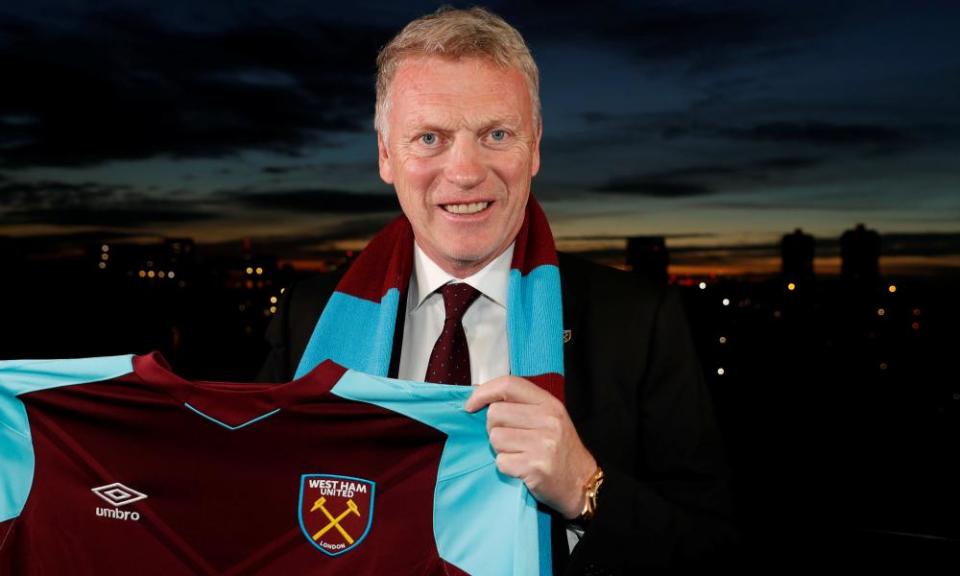Safety-first managers will leave Premier League on the hard shoulder | Liam Rosenior

Pep Guardiola, José Mourinho, Mauricio Pochettino, Antonio Conte and Jürgen Klopp – the managers of Premier League clubs who occupy the top five places in the table. All are world renowned for their differing but successful coaching styles and have excelled in their profession. Each is contrasting in terms of personality, image and footballing philosophy but there is a common denominator, which is they were exposed to top-tier management while in their 30s.
They achieved it differently but compared with managers in England they were coaching top-level clubs relatively young and able to apply their ideas and engage with players closely, partly owing to the benefit of their youth. After succeeding elsewhere they have arrived in England and have undoubtedly inspired and challenged young aspiring English coaches like me to learn and improve.
Think about those guys in relation to the appointment of David Moyes (54) at West Ham United and the interest Everton reportedly hold in appointing Sam Allardyce (63) to their vacant post. Both managers are the logical step in terms of an experienced, safe pair of hands who would be expected to guide these teams to safety from the financial perils of relegation.
The go-to argument is that they know the league but looking at the incumbents of the top five only Pochettino had previous Premier League experience, with Southampton, before being appointed at Spurs, while Mourinho first went to Chelsea from Porto. Pochettino’s arrival at St Mary’s in 2013 had experts and pundits ridiculing the club’s board for taking the decision to bring him from Espanyol and placing faith in the fundamental footballing principles that are the basis of his style of play.
Pochettino was neither safe nor experienced and if we look further back Espanyol were also questioned when they, as a solid La Liga club, appointed a man with no first-team experience to take charge. However, both clubs saw something special, something different, and we all know now that faith was repaid in abundance.
Strange as it may sound, if Barcelona were an English club – without the strong footballing philosophy and identity they possess within their culture – Guardiola, 38 at the time, would never have been appointed, though we all know the fantastic, evolved football thinking he has brought to the game in his relatively short career.
For years, we have asked where top English coaches with new ideas are coming from and then, without looking for the right person, clubs have instead opted to continue the seemingly endless obsession with the managerial merry-go-round.
Thus we see the same faces linked to every available job regardless of what they did at their previous clubs and due almost entirely to their experience of football in this country.
The reason for this is twofold and bound to the natural emotion in everyone that governs the ability to make decisions regardless of our circumstances: fear.
Fear of losing the vast sums of money now at stake in the Premier League that would be lost through relegation. Fear of ridicule and pressure from the media that, in certain areas, has an ever-increasing influence on the decision-making processes in Premier League boardrooms.
Marco Silva is someone who has challenged the status quo and has rightly gained admirers for his work at Hull City and Watford. But, again, look closer at his career and he was appointed aged 34 at Estoril with no previous experience; how many home‑grown managers are afforded that opportunity up and down the leagues in this country?
Moyes enjoyed a similar opportunity when he was appointed at a young age at Preston. After gaining experience and credibility there he moved on to Everton where he did an outstanding job in building a club over the years with his energy, ethos and philosophy running through it. The irony of this is that Moyes’s most successful part of his career was the earlier part and came when he was still a relatively young manager.
If we look at the numerous top young players being produced in the Bundesliga and the young coaches standing on the touchlines developing these players, I fear in England we are already being left behind and a whole generation of forward-thinking, innovative and progressive coaches will be lost to the game.
Football is too great a sport to be paralysed by fear and the longer it strangles our game and promotes safety-first appointments, and the accompanying arcane philosophy of football, we will end up with 14 or 15 Premier League clubs rejecting the opportunity to develop better futures in favour of focusing on survival.
Sign up to our weekly email, The Recap, here, showcasing a selection of our sport features from the past seven days.

 Yahoo Sport
Yahoo Sport 



































































